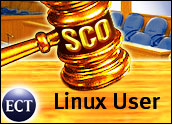
SCO, the company everyone in the Unix and Linux worlds loves to hate, has lost its latest angel investor.
Private equity firm Steven Norris Capital Partners had filed a memorandum of understanding tentatively offering US$5 million in stock and a $95 million loan the long-moribund SCO would use to pay off creditors and come back to life.
Now, SNCP has canceled the plan and is trying to buy SCO’s assets instead.
Third Time No Charm
This is SCO’s third attempt at reorganization. Previously, it had tried to sell off its assets, and had received money from an angel investor in 2003.
SCO’s backing and filling have irked the Department of Justice’s Trustee Program, which has warned that it is getting tired and is thinking of demanding that SCO be handed over to an independent fiduciary for dismantling if SNCP’s latest negotiations fall through.
Assuming SNCP now plans to buy SCO’s assets, how much will it pay?
Nothing like the $100 million it had originally prepared to shell out: In a Chapter 11 filing with the United States Bankruptcy Court for the District of Delaware in October 2007, SCO planned to sell JGD Management, doing business as York Capital Management, rights, title and interest to its Unix assets, properties and rights as well as transfer, cross-license and related agreements pertaining to the Hipcheck product line and Me Mobile intellectual property owned by Me Inc., a non-debtor affiliate of the debtors, as well as office equipment, and licenses, for up to $36 million with a down payment of $1.8 million.
Litigation Funding
In addition, SCO would get up to $10 million in litigation credit facilities to fund litigation expenses. In return, the buyer would get a 20 percent interest, not to exceed $100 million, in any and all litigation net proceeds after fees and expenses.
Not that SCO today is worth anything near that: In August of 2007, Salt Lake City U.S. District Court Judge Dale A. Kimball ruled that Novell owns rights to Unix and that SCO owes Novell 95 percent of the royalties it collected on Unix.
One month later, SCO filed under Chapter 11.
Blood on the Tracks
SCO has been embroiled with lawsuits since at least 2003, suing IBM and Novell over their use of Unix, over which it claimed ownership.
It also threatened to sue Linux vendors and, at one point, dragged the creator of Linux, Linus Torvalds, into court. However, it would not provide evidence to support its allegations.
IBM promptly counter-sued, subpoenaing everyone involved on SCO’s side — Baystar Capital, which had invested $50 million in SCO in October of 2003; Deutsche Bank, whose analyst Brian Skiba issued a “buy” recommendation on SCO stock the same month; and the Yankee Group, whose analyst Laura DiDio had advised corporate customers using Linux that they should take SCO’s claims seriously.
SCO “refused to specify where the infringements were on the grounds that the suspect code would simply be excised, and their claims would fall down,” longtime Linux industry insider Bill Weinberg, general manager of the LiPS Forum, told LinuxInsider.
“What was unusual compared to other copyright claims was that, in general, these begin with a letter, followed by a cease and desist letter and finally a lawsuit, but SCO started right off with a lawsuit,” he added.
LiPS is the Linux Phone Standards Forum, a consortium launched to create standards for using Linux on mobile devices.
Karma Bites
SCO’s launching a plethora of lawsuits against players in the Unix and Linux industries over the years, almost ruining several companies, has made it few friends.
“They managed to make a lot of enemies in a lot of interesting places,” Weinberg said. He was working for embedded Linux vendor MontaVista when the lawsuits were launched, and “when the suits came out our business was seriously threatened; their acts caused me and a lot of other people a lot of grief, cost us a lot of money and made us run around to justify and explain Linux,” he added.
“It is certainly a pleasure to see hubris rewarded.”


















































